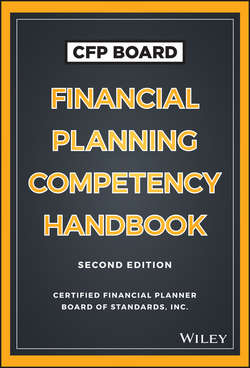Читать книгу CFP Board Financial Planning Competency Handbook - Board CFP - Страница 25
На сайте Литреса книга снята с продажи.
PART One
Introduction
CHAPTER 2
Function, Purpose, and Regulation of Financial Institutions
PROFESSIONAL PRACTICE CAPABILITIES
ОглавлениеEntry-Level: An entry-level planner working in a financial planning office environment should be able to differentiate among commercial banks, credit unions, trust companies, insurance companies, and brokerage firms as sources of consumer loans and investment assets. Additionally, entry-level planners should be well versed in basic financial institution and securities regulations and laws. The planner should be able to explain the fundamental aspects of the seven most important financial institution laws as outlined by the SEC, as well as explain the role and limitations associated with Federal Deposit Insurance Corporation (FDIC) deposit insurance.
Competent: A competent personal financial planner will have either completed Form ADV – application for registration of investment advisor – or, if not required to register, will have completed disclosure forms similar to what a registered investment advisor would provide clientele.
Expert: An expert personal financial planner should fully understand the history of financial institution regulation, SEC rules, rule-making procedures, and sources for researching rules and procedures. Additionally, someone who is an expert will monitor, on a regular basis, regulatory actions as published in the Federal Register, as well as regulatory actions, proposed rules, and rules releases as published by the SEC. This knowledge, when combined with experience and professional judgment, allows a financial planner to predict real and perceived violations of financial institution laws and ethical guidelines. An expert will be able to anticipate which, and when, personal and business actions will lead to violations of known laws.
